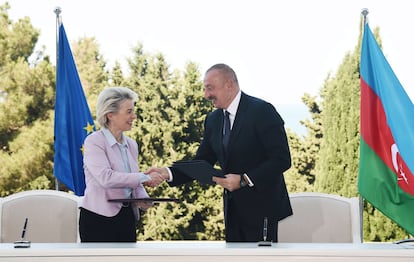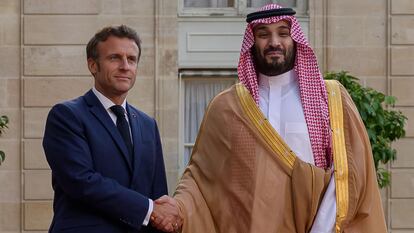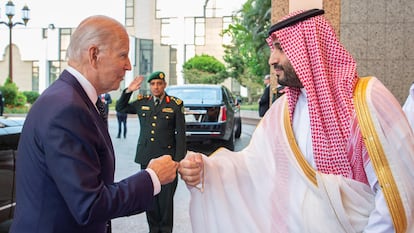The search for alternatives to Russian energy pushes the West closer to authoritarian regimes
The Saudi dictator’s visit to Paris comes after the US government has cooled tensions with Venezuela. Meanwhile, the EU has approached gas-producing dictatorships, such as Azerbaijan and Egypt

Russia’s invasion of Ukraine has pushed the West to secure alternatives to Russian energy. The search for new partners has pushed the European Union to strengthen ties with authoritarian regimes and avoid condemning countries that violate human rights. The United States, meanwhile, has eased sanctions on Venezuela and warmed relations with Saudi Arabia.

Even today, Russia supplies 40% of the natural gas that Europe imports – about 155 billion cubic meters per year. To find a way to stop paying Moscow for energy, countries like Germany and Italy have gone searching for alternatives in the liquefied natural gas market. They have been buying more gas than ever from Norway and the United Kingdom, bringing it in via ship or pipeline. But the largest increase in energy imports – up to 70% more than before the war – has been procured from suppliers who have a fairly bad record when it comes to democratic values and human rights.
In July, the European Commission reached an agreement with Azerbaijan to double gas imports from the energy-rich Caspian country. Purchases would go from 8.1 billion cubic meters per year in 2021 to about 20 million by 2027. The EU’s executive body has ignored NGOs that accuse the government in Baku of exerting massive repression against the country’s opposition forces.
The EU has also not hesitated to sign a memorandum with Egypt and Israel to import gas from those two countries, or from others in the region via Egyptian infrastructure. According to Human Rights Watch (HRW), “under the government of President Sisi, Egypt is experiencing one of the worst human rights crises in decades.” In the case of Israel, the same organization denounces crimes against humanity against millions of Palestinians. This has not prevented the EU from considering the resumption of Association Agreement talks with what HRW considers to be an apartheid state.
The European Commission estimates that gas will account for 22% of the EU’s energy consumption until at least 2030. Hence, adequate supplies are required for the rest of this decade. Qatar is another country identified as being essential to guaranteeing the security of this supply, despite criticism of the labor and social conditions that prevail in that country, especially harsh for the immigrant population.
This is by no means the first time that the EU practices realpolitik without hesitation. In the migratory field, the 27 European partners did not hesitate to reach a billion-dollar agreement with Turkey so that President Erdogan would prevent the passage of Syrian refugees into EU territory. Brussels has also financed migration control in Libya, despite the inhumane treatment of sub-Saharan people who try to cross the Mediterranean from the coast of the African country.

The conflict with Russia has also led the Biden administration to drastically alter its relationships with other countries, namely Venezuela and Saudi Arabia. During the 2020 campaign that brought him to the White House, Biden vowed to make Saudi Arabia a “pariah.” This was due to the fact that US security agencies had confirmed that the Saudi crown prince, Mohammed Bin Salman (MBS), had ordered the 2018 execution and dismemberment of Washington Post columnist Jamal Khashoggi, a Saudi citizen and US resident.
Biden had to swallow his words two years later. On July 15, during a controversial tour of the Middle East, he stopped in Jeddah to meet with members of the Saudi regime, purportedly to discuss energy security, normalization with Israel and the threat of Iran. The American President fist-bumped MBS before the cameras.
With gas prices and inflation soaring, the automobile-dependent United States has, once again, gone looking for oil in unfriendly neighborhoods. After announcing new technological and defensive cooperation, the White House declared triumphantly that Saudi Arabia had committed to an “increase in production levels [of oil] by 50% above what was forecast for July and August.” This would allow for the oil market to “stabilize considerably.”
It is true that, just 100 days before America’s November midterm elections – where the Democratic Party could lose both the House and the Senate to the Republicans – gasoline prices seem to have levelled off. The national average of what is paid for a gallon has fallen by 70 cents since its peak, which was above $5 (€4.92) in early June. Analysts expect prices to continue to decline through the end of the year, although they are still high compared to 2021.
As part of that same policy of searching for strange bedfellows in the midst of an unprecedented energy crisis, officials from the Biden Administration travelled to Caracas in March to meet with members of Nicolás Maduro’s regime. Venezuelan crude skyrocketed in value following international sanctions being imposed on Russia. A few days after that visit, a US veto of Moscow’s oil was announced.
That initial trip was followed by other gestures to soften relations with the Maduro regime. The United States – which continues to recognize opposition leader Juan Guaidó as the legitimate president – has recently loosened some of its sanctions against Venezuela. According to a senior White House official, this has been done to encourage dialogue with the opposition. The timing, however, suggests that other matters were more pressing.
Tu suscripción se está usando en otro dispositivo
¿Quieres añadir otro usuario a tu suscripción?
Si continúas leyendo en este dispositivo, no se podrá leer en el otro.
FlechaTu suscripción se está usando en otro dispositivo y solo puedes acceder a EL PAÍS desde un dispositivo a la vez.
Si quieres compartir tu cuenta, cambia tu suscripción a la modalidad Premium, así podrás añadir otro usuario. Cada uno accederá con su propia cuenta de email, lo que os permitirá personalizar vuestra experiencia en EL PAÍS.
¿Tienes una suscripción de empresa? Accede aquí para contratar más cuentas.
En el caso de no saber quién está usando tu cuenta, te recomendamos cambiar tu contraseña aquí.
Si decides continuar compartiendo tu cuenta, este mensaje se mostrará en tu dispositivo y en el de la otra persona que está usando tu cuenta de forma indefinida, afectando a tu experiencia de lectura. Puedes consultar aquí los términos y condiciones de la suscripción digital.








































